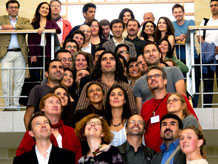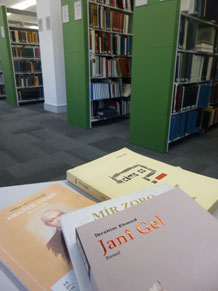
The Centre for Kurdish Studies benefits from the activities of several members of staff recognised as specialists in different disciplinary areas.

The Centre for Kurdish Studies benefits from Exeter’s large specialist library collections on the Middle East.
About us
The Centre for Kurdish Studies in Exeter is unique outside the Kurdish homelands. Since its founding in 2006, it has played a leading role in research and teaching that focuses on the Kurds and Kurdistan across various disciplines. We are proud to have supervised more than 25 PhDs in Kurdish Studies or closely allied areas; many of these have shifted paradigms in our field and helped to form the vibrant field of research and teaching practice that is Kurdish Studies today.
Initial funding for our centre was provided by the Ibrahim Ahmad Foundation, a charity established by the family of the notable Kurdish politician and poet Ibrahim Ahmad to promote the study of Kurdish language, literature, culture and history. Thanks to this generous support, two Ibrahim Ahmad academic positions (one lectureship and one professorship) have been funded at the University of Exeter. This support to the Centre was augmented with important scholarship funds awarded by the Prime Minister of the Kurdistan Regional Government (KRG), HE Nechirvan Barzani. With this the Centre was able to build strong foundations, including a series of scholarships which promoted our development of strong research, teaching activities and international networks. Our Centre now includes three permanently-employed academics and a number of research fellows.
Exeter is the only British university to have developed a strong research focus in the field of Kurdish Studies, including the teaching of Kurmanji and Sorani dialect whenever resources allow. As such, we are the leading centre of research in the field in the UK, and one of the global centres of excellence. The Centre has built cooperation with scholars worldwide and aims to develop further this current collaboration and to launch further research initiatives. We are excited by the possibilities that are now available with our new ways of working, and look forward to exploring them! With our programme of international conferences, workshops and seminars, we also provide a forum for the discussion of topics relevant to Kurdish Studies.
Our focus on Kurdish Studies places the Kurds at the centre of our research and teaching activities, and offers a chance to consider Kurdish society, culture and politics holistically in all its complexity and variation, across and within established nation-states and the global diaspora community.
The Centre for Kurdish Studies is physically located in the Institute for Arab and Islamic Studies (IAIS) and is part of the College of Social Sciences and International Studies, the Centre staff and students contribute to this wider education and research environment. This interaction between students and staff from different areas and disciplines is highly valued as strengthening the academic foundations of Kurdish Studies. Indeed, the Centre’s vision is that strong Kurdish Studies can only be built through dialogue with other areas, and with a strong grounding in different academic disciplines.
